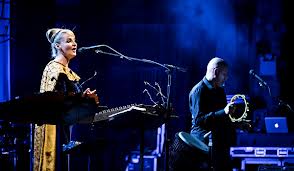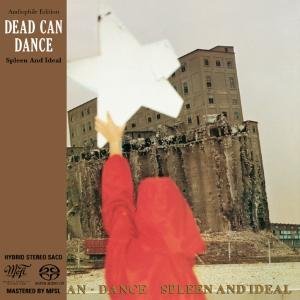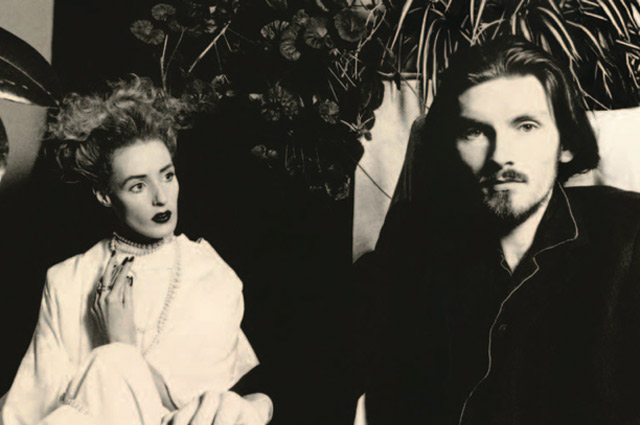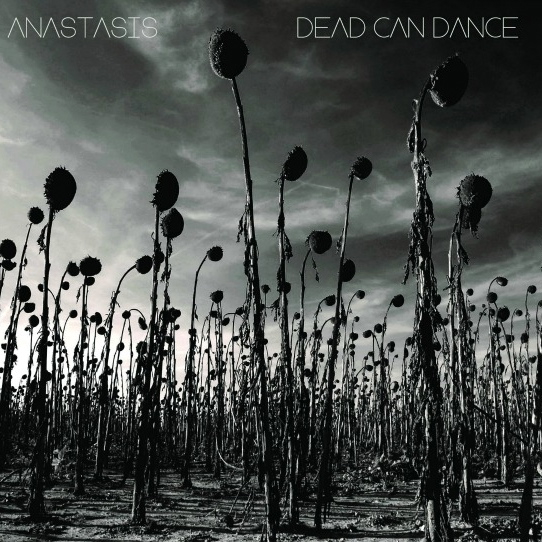
Dead Can Dance Live 2012
On the day of our Exclusive broadcast of Dead Can Dances performance in Geneva in October, I unearthed this article I wrote on the band back in 1990 for CD Review Magazine. It still seems pretty up-to-date.
Stepping into the music of Dead Can Dance is like traveling through an ancient culture and hearing an archaic language. Only it’s a language that was never spoken until Dead Can Dance singer Lisa Gerrard gave it voice. Lisa Gerrard sounds like she’s intoning some arcane dialect, but according to Brendan Perry, the other half of Dead Can Dance, she’s actually creating her own hybrid language.”I suppose the best way to explain her approach to the human voice as an instrument is in a sense speaking in tongues as opposed to any particular tongue,” he stated in the New York offices of 4AD Records back in 1990 when their Aion album was released. “They [the lyrics] all are influenced by various languages but have no syntactical meaning in any given language.”
 Which doesn’t mean that Gerrard isn’t communicating anything. Her voice coils around the gothic ambiences of Dead Can Dance, creating Gregorian-like chants on “The Arrival and the Reunion” that would fit right into a monastery of the Dark Ages if it weren’t for the elaborate polyphony. On the other hand, “Avatar” from the 1985 disc Spleen and Ideal sounds like a dervish mantra.
Which doesn’t mean that Gerrard isn’t communicating anything. Her voice coils around the gothic ambiences of Dead Can Dance, creating Gregorian-like chants on “The Arrival and the Reunion” that would fit right into a monastery of the Dark Ages if it weren’t for the elaborate polyphony. On the other hand, “Avatar” from the 1985 disc Spleen and Ideal sounds like a dervish mantra.
At the time, Gerrard was loath to assign specific meanings to her vocal flights. In fact, the delicately boned, blonde singer rarely gave interviews back then. She had refused to sit down for an interview with me, leaving it all to Perry. I only got her then when she came to gather Brendan Perry. I leaned over the table, pointing my microphone in her direction and just ambushed her with questions.
“The thing that is important to me is to break the barrier of language and to communicate something without words that’s for everyone,” she stated in a painstaking cadence, as if every word is being wrenched from her soul.

Dead Can Dance from 1980s
Dead Can Dance got together in Australia, where their parents had emigrated from Ireland and England. They fell in love with each other and Arabic music. “When I first met Lisa in Australia, we were on the dole [unemployment] at the time in Melbourne. We worked in a few Arab restaurants, Lebanese restaurants and things and they used to play middle eastern music recordings and we used to make copies of them. We just fell in love with that music together.”
They started as a sort of doom and gloom techno-rock band, but discovered a new sound on the song “Frontier” with homemade metal percussion that sounded like a troupe of Turkish darbuka players and Gerrard taking her first stab at free vocalise. A move to London and the 4AD label yielded their self-titled debut in 1984.
 Their music is drawn from Gregorian, middle eastern and Bulgarian open-throat singing styles and surrounded by instruments like the Turkish saz, the hurdy-gurdy, and the yang ch’in, a Chinese hammered dulcimer that Gerrard plays in a style of the Persian santoor. Combined with synthesizers and strings, they create a ritual music.
Their music is drawn from Gregorian, middle eastern and Bulgarian open-throat singing styles and surrounded by instruments like the Turkish saz, the hurdy-gurdy, and the yang ch’in, a Chinese hammered dulcimer that Gerrard plays in a style of the Persian santoor. Combined with synthesizers and strings, they create a ritual music.
While Lisa Gerrard keeps her meaning hidden in glossolalia, Brendan Perry is eager to articulate his thoughts through music, which might explain why he sings in a rich tenor, in English. “I’ve always felt more inclined towards the ballads, the sense of poetry of the language,” he says. However, on their first U. S. concert tour in the fall of 1989, he was also exploring the same ecstatic style as Gerrard.
Gerrard, however, eschews these discussions. “From an interior point of view, the work that I do is original to me,” she claims. “There’s the exterior identification with sound and there’s the interior projection of communication which you cannot talk about. That’s why I don’t do interviews. Because you try to talk about that in abstracts. And the abstracts are never understood and really it’s better to just listen to the work.”
Listening to the work of Dead Can Dance reveals a sound that’s as close as modern music comes to rapture.
Originally published in CD Review in 1990.
Here’s more on Dead Can Dance from Echoes.
2012 Echoes Dead Can Dance Interview Podcast.
Review of Latest Dead Can Dance album, Anastasis
Five Essential Dead Can Dance Albums
AND don’t forget to vote in the Best of Echoes 2012 Poll NOW! Closes at 6AM Monday 12/17/2012
~© 2012 John Diliberto ((( echoes )))

1 comment for “The Ritual and Rapture of Dead Can Dance.”